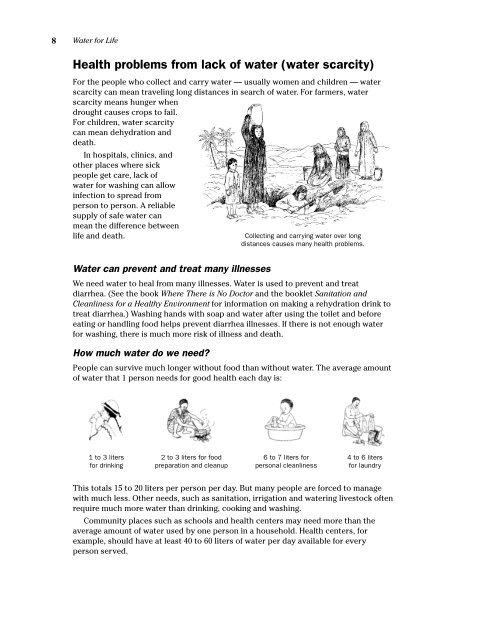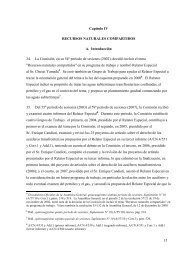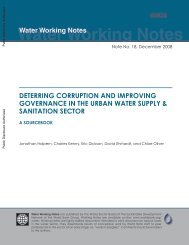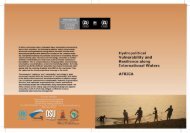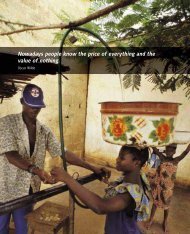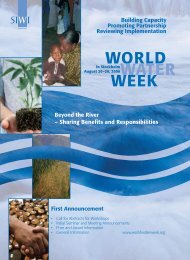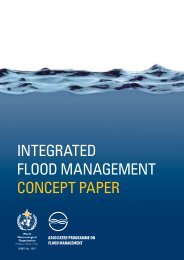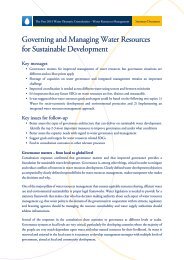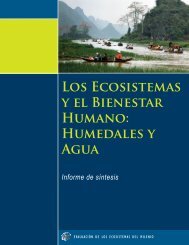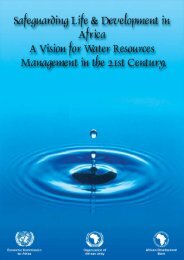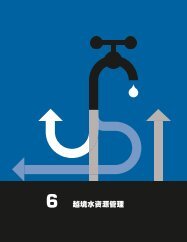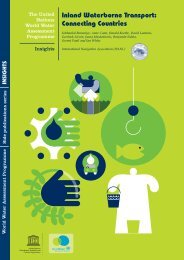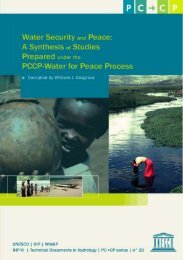Community water security - UN-Water
Community water security - UN-Water
Community water security - UN-Water
You also want an ePaper? Increase the reach of your titles
YUMPU automatically turns print PDFs into web optimized ePapers that Google loves.
8<br />
<strong>Water</strong> for Life<br />
Health problems from lack of <strong>water</strong> (<strong>water</strong> scarcity)<br />
For the people who collect and carry <strong>water</strong> — usually women and children — <strong>water</strong><br />
scarcity can mean traveling long distances in search of <strong>water</strong>. For farmers, <strong>water</strong><br />
scarcity means hunger when<br />
drought causes crops to fail.<br />
For children, <strong>water</strong> scarcity<br />
can mean dehydration and<br />
death.<br />
In hospitals, clinics, and<br />
other places where sick<br />
people get care, lack of<br />
<strong>water</strong> for washing can allow<br />
infection to spread from<br />
person to person. A reliable<br />
supply of safe <strong>water</strong> can<br />
mean the difference between<br />
life and death.<br />
Collecting and carrying <strong>water</strong> over long<br />
distances causes many health problems.<br />
<strong>Water</strong> can prevent and treat many illnesses<br />
We need <strong>water</strong> to heal from many illnesses. <strong>Water</strong> is used to prevent and treat<br />
diarrhea. (See the book Where There is No Doctor and the booklet Sanitation and<br />
Cleanliness for a Healthy Environment for information on making a rehydration drink to<br />
treat diarrhea.) Washing hands with soap and <strong>water</strong> after using the toilet and before<br />
eating or handling food helps prevent diarrhea illnesses. If there is not enough <strong>water</strong><br />
for washing, there is much more risk of illness and death.<br />
How much <strong>water</strong> do we need?<br />
People can survive much longer without food than without <strong>water</strong>. The average amount<br />
of <strong>water</strong> that 1 person needs for good health each day is:<br />
1 to 3 liters<br />
for drinking<br />
2 to 3 liters for food<br />
preparation and cleanup<br />
6 to 7 liters for<br />
personal cleanliness<br />
4 to 6 liters<br />
for laundry<br />
This totals 15 to 20 liters per person per day. But many people are forced to manage<br />
with much less. Other needs, such as sanitation, irrigation and <strong>water</strong>ing livestock often<br />
require much more <strong>water</strong> than drinking, cooking and washing.<br />
<strong>Community</strong> places such as schools and health centers may need more than the<br />
average amount of <strong>water</strong> used by one person in a household. Health centers, for<br />
example, should have at least 40 to 60 liters of <strong>water</strong> per day available for every<br />
person served.


